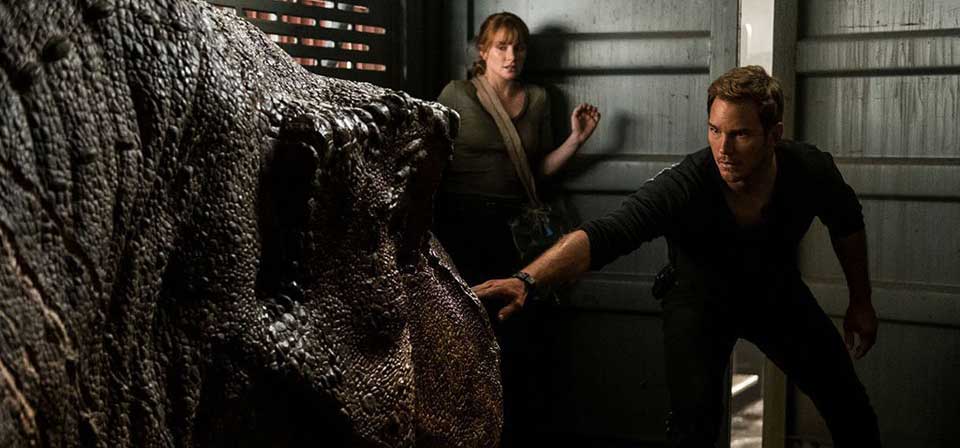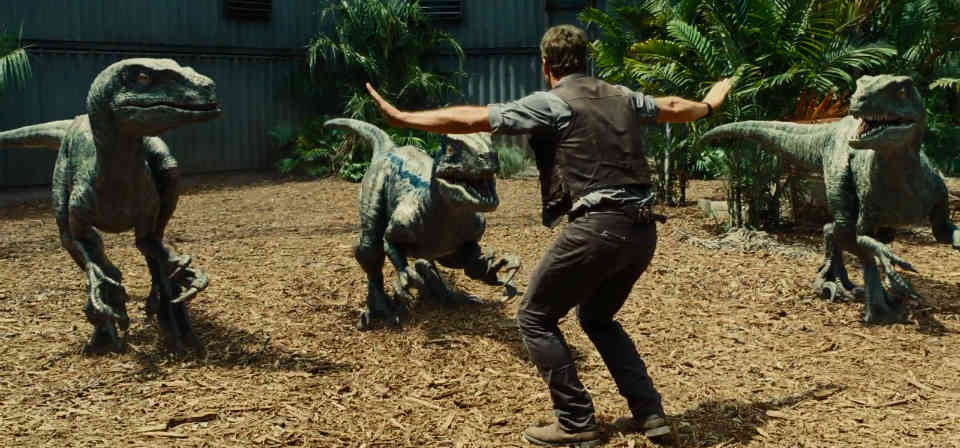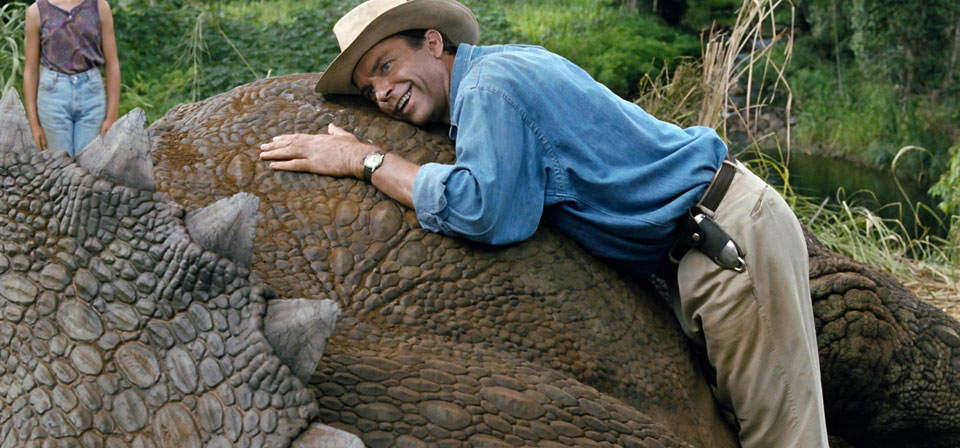Jurassic World Dominion (2022)
The word “dominion” is uttered once in Jurassic World Dominion, in an oblique, irreverent allusion to Genesis 1. “Not only do we lack dominion over nature, we are subordinate to it,” asserts Dr. Ian Malcolm (Jeff Goldblum) in one of his trademark, smugly iconoclastic epigrams. Later in the same speech, though, Malcolm turns with surprising optimism to the power of genetic science to shape the future. Does he really believe this? Is this speech coherent? Is the film itself coherent?
It turns out that there’s a rationale for the speech, sort of, but it’s the kind of thing that merely pushes the incoherence back a step. Trying to explain Jurassic World Dominion is like pulling a loose thread that keeps getting longer until there’s nothing left to unravel. Even by the standards of prior Jurassic World movies, it’s a deeply stupid movie, full of inexplicably dumb choices not only by characters who are allegedly smart, but also by the filmmakers whose work must speak for itself. Granted, the original Jurassic Park dumbed down the brainy Michael Crichton novel, but it also knew the plot was there to serve the thrills and spectacle of the premise. Jurassic World Dominion has so many moving parts — so much plot, so many characters — that for long stretches it loses track of the dinosaurs altogether. And neither the plot nor the characters are worth our time.
Caveat Spectator
Much intense menace and stylized dinosaur-related violence, including a number of deaths; oblique suggestive and crass references; some cursing and brief profanity.For a while it seems Dominion wants to be the franchise’s Mission: Impossible. Instead, it’s the anti–Top Gun: Maverick.
The achievement of this summer’s extraordinary Tom Cruise legacyquel includes projecting the characters, themes, and trajectories of the original Top Gun more than three decades into the future, gracefully revisiting nearly everything fans loved about the 1986 blockbuster while also shrewdly patching up its issues and improving on it at every turn. Jurassic World Dominion can’t even manage to carry on the themes and trajectories of its immediate predecessor, Jurassic World: Fallen Kingdom, let alone any of the prior Jurassic films. Maverick almost makes Top Gun a better movie retroactively. Jurassic World Dominion can’t touch the Jurassic Park trilogy, but, capping the Jurassic World trilogy, it makes its two predecessors retroactively worse.
Here is just one example. The entire plot of Jurassic World: Fallen Kingdom is driven by a single force, one that’s been there from the first Jurassic Park movie: the enormous dollar value of dinosaur specimens to big-money black-market buyers, from private collectors to pharmaceutical or military industrial researchers. (Many have argued that the bids seen in Fallen Kingdom’s elite auction sequence, in the mere tens of millions, were absurdly low.) Dominion also features a black-market setting, located on the European island nation of Malta — but, far from catering to an ultrawealthy clientele, it’s a rough, sleazy joint with booths grilling dino meat and a dogfighting-style pit for, you know. What conceivable sense does it make for dinosaur flesh to be counted so cheap? Granted that the last film ended, absurdly, with turning dinosaurs loose on the world, so that all sorts of people can now get their hands on them, the specimens at liberty are presumably fewer than the assets of the defunct Jurassic World theme park. (These are creatures genetically designed not to breed on their own. Life finds a way in at least one case, but that seems to be the exception.) If there were 10,000 dinosaurs of all species combined to start with, it would be a lot — and that’s before the predators started picking off the others and one another. Of those that survived, not all were smuggled off Isla Nublar; some were left to die. Of those who were turned loose, some have been recaptured, killed, or snapped up for private and corporate interests.
Who, then, would be roasting procompsognathus meat in a dodgy underground market when multibillionaire foodies would pay unthinkable sums for live specimens to be prepared fresh by their personal kitchen staff? Who would pit the rarest animals on Earth against one another in blood sports for mere betting-action money when there’s no limit to what industrial giants would pay for the same creatures? This is what the last movie was about, so the questions matter. Worse still, by the end the movie appears to lose track of the entire issue. The whole weight of the world’s industrial appetite for genetic power is laid on a single dirty corporation and a single unscrupulous CEO, as if the chaotic downfall of one more misbegotten enterprise could somehow usher in a new age of global peace and almost eschatological harmony — legit “lion lying down with the lamb” territory, as if taking us from Genesis to the Apocalypse in two and a half hours.
The one thing Dominion has going for it is the mark of all true legacyquels, at least as the term was originally defined: beloved, aging stars reprising classic roles. With the return of Sam Neill as Alan Grant and Laura Dern as Ellie Sattler, Dominion reunites for the first time all three principals of the original Jurassic Park, along with one other original cast member, BD Wong, whose geneticist Henry Wu became a semi-villainous figure in the first two Jurassic World movies. Another character from the original film, bio-espionage agent Dr. Lewis Dodgson (as in “We’ve got Dodgson here!…See, no one cares”), is also back in a bigger role, albeit recast with Campbell Scott replacing convicted sex offender Cameron Thor. (Dodgson had only one scene in Jurassic Park, but he was a bigger deal in the two Crichton novels.) Of course Chris Pratt and Bryce Dallas Howard are back as, respectively, velociraptor trainer Owen Grady and former Jurassic World park manager Claire Dearing. I don’t even know where to start with them, so let me go back to the returning players for a moment. I said in my Top Gun: Maverick review that if a legacyquel “is pretty good, it will be like a reunion with old friends.” Dominion is not pretty good, but I’d be lying if I said I didn’t enjoy catching up with Alan, Ellie, and Malcolm. Dern, especially, is a welcome presence, for several reasons: because she’s so good; because she only had a cameo in Jurassic Park III; and because women in older middle age just don’t get cast in action movies the way older men do.
Ellie also feels like a real character, which can’t be said for Claire. Claire started off as a corporate ice queen who was bad with kids and saw dinosaurs only as assets. By the second film, she was an environmental crusader for dinosaur rights. Now she’s a guerrilla zealot liberating dinosaurs from shady operators and also a mama bear living in the woods helping to raise a special teenaged girl named Maisie Lockwood (Isabella Sermon), whose genetic history makes her important to powerful people for mysterious reasons that turn out to be one of the stupidest conceits in this deeply stupid film. (But not the stupidest, because the same people also want a baby raptor for reasons that make even less sense. And all of this relates to a malicious corporate scheme that a 12-year-old would realize an 8-year-old would see through, and a ridiculously labyrinthine whistleblower plot to blow a whistle that could be more easily blown any number of ways.)
Two actors playing brand-new supporting characters make a bigger impression than any of the non-legacy characters. Mamoudou Athie plays Ramsay Cole, a slyly polished corporate functionary playing a much longer game than he ought to be. DeWanda Wise is Kayla Watts, a freelance ex-military pilot who sticks her neck out for nobody until, in the time-honored tradition, she does. If you aren’t paying attention to self-congratulatory publicity around the film, you could be excused for not realizing that Wise’s character is meant to be bisexual, an allegedly brave, important character choice reduced, so far as I can tell, to a fleeting remark about “liking redheads.”
Sometimes-energetic action sequences — at times verging on Jason Bourne or Ethan Hunt territory, but with raptors or larger predators — are undermined by cheap manipulation of variables empowering the dinosaurs to do exactly as much as the heroes can withstand, and no more. Owen’s restraining hand gesture, which we bought in the first Jurassic World because it invoked lifelong training and bonding with a particular set of raptors, is now a magical flourish that throws all dinosaurs for a loop. A lengthy, harrowing sequence with two pairs of military-trained raptors chasing Owen on a motorcycle and Claire and Kayla in a truck loses steam once it becomes clear that the raptors never will. (Lose steam, that is; unlike real predators, they run at top speed as long as the scene goes on, never tiring, never slowing down.) Conversely, a ridiculous sequence pitting all the heroes together against the franchise’s latest big bad — a more formidable cousin of the T-rex called Giganotosaurus — is almost comical in how poorly Giganotosaurus performs and how brazenly the humans thwart it. The 1993 film’s T-rex would have eaten them all halfway through the scene.
Dominion is directed by Colin Trevorrow, who also directed the 2015 Jurassic World and co-wrote all three films. The middle movie, Fallen Kingdom, was directed by J.A. Bayona, a proficient artist who at least invested his installment with striking images and evocations of Spielbergian tension and excitement: achievements Trevorrow can’t begin to touch. Even the better action sequences only remind us how firmly Ethan Hunt owns this territory now. I spent most of Dominion wishing I was watching other movies: the original Jurassic Park; Top Gun: Maverick; next year’s Mission: Impossible installment. The world of late 20th-century Hollywood action franchises may not be quite extinct, but, absent Cruise (who will be 60 in July) and perhaps George Miller (who will be nearly 80 if he completes his Mad Max: Fury Road prequel Furiosa on schedule), filmmakers capable of carrying on the tradition seem to be.
Related

Jurassic World: Fallen Kingdom (2018)
Apparently velociraptor is the cowbell of dino design and the filmmakers are Christopher Walken.

Jurassic World (2015)
Pratt more than delivers. You could almost say he manages to stand in for Sam Neill, Jeff Goldblum and Laura Dern. He’s got Neill’s toughness, Goldblum’s humor and Dern’s down-to-earthness. His character, Owen Grady, is Jurassic World’s velociraptor trainer, and in a terrific early set piece Pratt persuades me that he’s capable of standing up to three raptors armed with nothing but charisma and nerve.

Jurassic Park (1993)
In the twenty-odd years since Jurassic Park pioneered the use of photorealistic computer-animated living creatures integrated into a live-action film, computer animation has become even more prevalent. Yet in all that time, it’s hard to think of a single blockbuster spectacle that uses computer imagery to achieve a similar sense of awe and grandeur.
Jurassic Park [video]
Jurassic Park in 60 seconds: my “Reel Faith” review.
Recent
- Benoit Blanc goes to church: Mysteries and faith in Wake Up Dead Man
- Are there too many Jesus movies?
- Antidote to the digital revolution: Carlo Acutis: Roadmap to Reality
- “Not I, But God”: Interview with Carlo Acutis: Roadmap to Reality director Tim Moriarty
- Gunn’s Superman is silly and sincere, and that’s good. It could be smarter.
Home Video
Copyright © 2000– Steven D. Greydanus. All rights reserved.